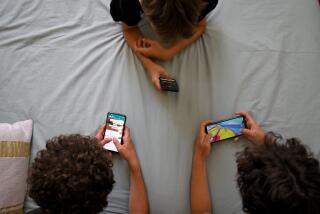5 days away from computer screens boosts preteens’ social awareness

What happens when you take about 50 sixth-graders and send them to a nature camp with no access to computers, tablets and mobile phones? A new study suggests that after just five days their ability to understand nonverbal social cues improves.
Nonverbal social cues are the emotional information we pick up from people around us that is not communicated through words. It includes facial expressions, eye contact, tone of voice and body posture.
As children spend more time corresponding with their friends via text rather than talking to them face to face, the researchers wondered whether they were losing the ability to read these important cues.
“The idea for this study came from looking at the way my older child and her friends’ older siblings were communicating,” said Yalda Uhls, who runs the Los Angeles office of the nonprofit Common Sense Media. “I’ve been at parties where the kids are all hanging out, but instead of looking at each other, they are staring at their phones.”
Uhls, who is the lead author of the study published in the journal Computers in Human Behavior, wanted to see what would happen if a group of children had to spend an extended period of time communicating completely device-free.
Uhls and senior author Patricia Greenfield of UCLA found a public school that sends its sixth-grade class to a wilderness camp near Big Bear for five days. At the camp, the students have no access to electronics.
When the class of about 50 children arrived at the camp, they were asked to take two tests to measure their ability to read nonverbal social cues. In the first, the kids were asked to assess the emotions portrayed in 48 photos of people making faces. In the second test, they watched a video with the sound turned off, and then made a judgment about the emotional state of the actor.
At the end of the five-day camp, the students were asked to take the tests again. The researchers report that over the five days the kids went from making an average of 14.02 errors on the face-recognition test at the beginning of their camp stay to 9.41 errors by the end. For the video component, they went from getting an average of 26% of the emotional states correct to getting 31% correct.
“Honestly, we were pretty surprised that just five days would have that effect,” said Uhls. “But we think this is good news because if indeed lack of face-to-face time is changing people’s ability to understand emotion, our results suggest you can disconnect for five days and get better.”
The researchers gave the same test to a control group of 54 sixth-graders from the same school who had not yet attended the camp. That group had an average of 12.24 mistakes the first time they took the face-recognition test and 9.81 mistakes when they took it again five days later. For the video test, the students’ scores stayed flat, getting an average of 28% of the emotions correct both times they were tested.
Though the children who were at the camp showed a larger improvement over the five days than those who did not go to camp, the end results were not that different.
“I noticed that too,” said Uhls, “but even though the kids ended up in the same place, they started at different places, so the change is what we are really looking at.”
Uhls and Greenfield said the results of their study suggest that it is important for kids to spend time away from screens, but it doesn’t necessarily suggest that all screen time is bad.
“The main thing I hope people take away from this is that it is really important for children to have time for face-to-face socializing,” said Uhls. “I love media, my kids are media-savvy, but it is really important to have a balance.”
Do you love to learn? Follow me @DeborahNetburn and “like” Los Angeles Times Science & Health on Facebook.







